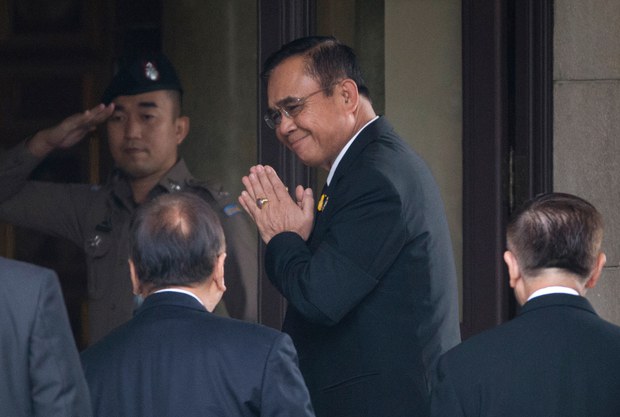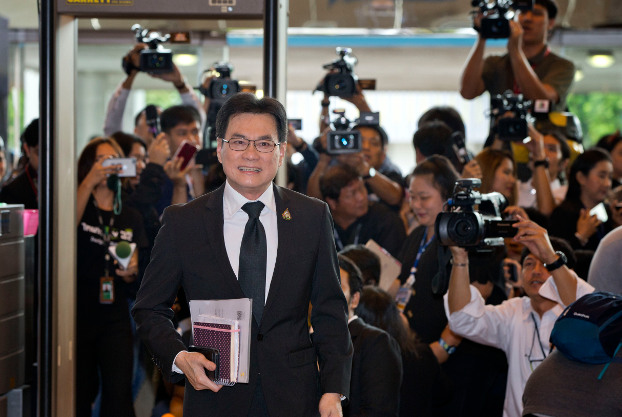Thai Prime Minister Grapples with Coalition Cabinet Appointments
2019.06.07
Bangkok
 Thai Prime Minister Prayuth Chan-o-cha (center) arrives at the Government House in Bangkok, June 6, 2019.
Thai Prime Minister Prayuth Chan-o-cha (center) arrives at the Government House in Bangkok, June 6, 2019.
Fresh from his election as prime minister, junta chief Prayuth Chan-o-cha is facing hurdles in his bid to form a new cabinet while keeping his political coalition intact, an analyst and Thai media reports said Friday.
Prayuth was endorsed as prime minister by parliament Wednesday after the military-backed Palang Pracharat Party formed a coalition with 18 other parties to secure his election, even though he did not run for a legislative seat in the March 24 general polls.
Two major members of the coalition, the Democrat Party and the Bhumjaithai Party, agreed to vote for Prayuth, who seized power in a May 2014 coup, after being assured they would receive cabinet posts in the new government.
According to reports, three coalition parties are bickering over key portfolios, including the agriculture ministry, which is crucial for the Democrat Party to strengthen its rural base.
“In his first term, he ordered everyone as he selected them by himself. This new term, he must go through negotiations with coalition and many parliamentary debates,” political analyst Anusorn Unno told BenarNews.
Anusorn, dean of sociology and anthropology at Thammasat University in Bangkok, expressed concerns that the new government could have a short lifespan.
“I think the government certainly does not have stability, but we have to wait and see what the cabinet looks like and if he can control it,” Anusorn said. “If the cabinet comprises uncontrollable men, he could have a hard time using his power.”
“I think it won’t last beyond a couple of years,” he said.
Leading up to the vote for prime minister, the Democrat Party sought a leading portfolio in agriculture in exchange for its votes. The deal so angered one of its former leaders, former premier Abhisit Vejjajiva, that he quit the party and then resigned from parliament on Wednesday.
The Bhumjaithai Party joined after being assured it would have a lead role in the public health portfolio to push for legalization of medical marijuana, according to media reports.
But those deals hit snags less than 48 hours after the vote, reports said.
Wranglings over cabinet portfolios had not settled amid possible back-tracking over promises made prior to Wednesday’s parliamentary vote, according to the thethaiger.com.
Palang Pracharat leaders, meanwhile, had insisted on maintaining control of the cabinet posts promised to the two coalition members and cancelled the deal, according to The Nation.
Puttipong Punnagun, a Palang Pracharat member, said while Prayuth may change ministerial portfolios, he does not see such a move as hurting the coalition.
“There might be a small revision, but it is not a friction. It is Prayuth’s right to do so, if needed,” Puttipong said. “I believe in working together, we need to look at many aspects, such as the suitability of the nominees to push forward an action plan and work efficiently.”

Coalition leaders speak out
A Democrat Party leader told reporters on Friday he expects the deal to stick.
“I am telling you this – there was agreement between the Palang Pracharat and Democrat parties and I believe it’s because we have talked for a certain period of time and reached an agreement,” Jurin Laksanawisit said.
Those discussions led to an agreement on another issue important to the Democrat Party.
“One core condition is that we amend the constitution to make it more democratic. That is one of the conditions we agreed to before joining the government,” Jurin said without elaborating.
The Bhumjaithai Party leader, on the other hand, offered a pragmatic view.
“We are here to work and not to negotiate. We want to work in the ministry as we promised people as part of our platform during the campaign. We think we can do what we are good at,” Anutin Charnvirakul said on Thursday.
“But we will compromise to push the country forward.”
As the new cabinet takes shape, Anusorn said Prayuth’s military background could hurt him in his efforts to maintain a democratic government.
Five years ago, then-Gen. Prayuth led a military coup that ousted the democratically elected government of Yingluck Shinawatra, appointing himself leader of the junta government that has been in charge since then.
Yingluck is the younger sister of Thaksin Shinawatra, the leader of the opposition Pheu Thai party who lives in exile and was deposed by a similar military coup in 2006.
“Prayuth came from the military coup background, now he follows parliamentary procedure, but he has denied a few parliamentary traditions,” Anusorn said, referring to reports that PPP is pulling back on the portfolio deal. “With his military-type personality but under parliamentary rules, I think the government will struggle and would likely not last long.”
“He may still act like a junta leader,” he said. “That won’t be easy.”
Wilawan Watcharasakwet in Bangkok contributed to this report.








